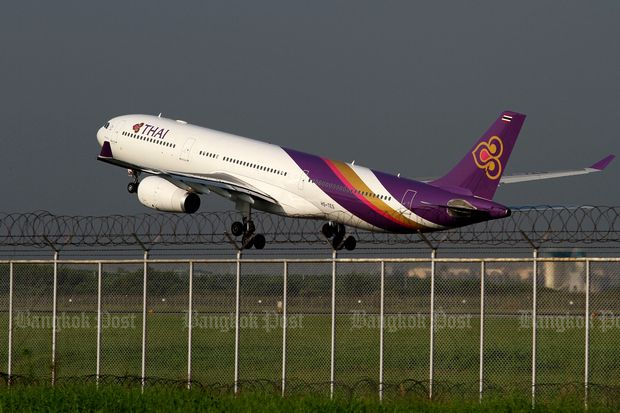
Thai Airways International Plc’s consolidated net loss deepened to 11.6 billion baht last year compared with a loss of 2.1 billion in the previous year due to higher fuel and repair costs.
Losses per share stood at 5.33 baht compared with 0.97 baht in 2017, the flag carrier told the Stock Exchange of Thailand on Friday.
While operating income rose 3.9% year-on-year to 199.5 billion baht, operating expenses exceeded that figure by 6 billion baht, the flag carrier said on its official Thai-language “Thai Airways” Facebook on Friday afternoon.
Sumeth Damrongchaitham, who was named president of the airline in September 2018, said that during the year THAI took delivery of five planes and decommissioned two Boeing B737-400s, resulting in a net addition of three planes to its fleet to 103 as of the end of last year. The utilisation rate remained at 12.0 hours, the same level as last year.
Available seat kilometres (ASK) rose 2.9% last year while revenue passenger kilometres (RPK) climbed 1%. The cabin factor averaged 77.6%, down from 79.2% in 2017.
In 2018, THAI flew 24.3 million passengers in total, down 1% year-on-year.
During the year, the airline adopted some accounting changes. The estimated remaining value of planes and parts was cut to 6% from 10% of initial costs, resulting in depreciation costs rising by 3.1 million baht.
Sold tickets which have not been used were also booked as revenue after 15 months instead of 24 months, resulting in a 1-billion-baht increase in fare revenue.
The company said competition remained high in 2018 and fuel prices were at the highest levels in four years.
Consolidated revenue rose 3.9% to 199.5 billion baht last year from fare and excess baggage incomes, postal fees and other incomes.
At the same time, operating costs jumped 10.3% to 205.6 billion baht, mainly due to higher fuel costs, up 19.7% compared with a 30% average increase in fuel prices.
Excluding fuel prices, operating expenses rose 7.3%, or 9.8 billion baht, mainly due to higher repair and maintenance costs, plane rentals and depreciation costs.
Meanwhile, net financial costs fell 4.7% to 215 million baht thanks to better cash management and ongoing financial restructuring.
Due to these factors, operating losses totalled 9 billion baht last year compared with an operating profit of 2.8 billion in the previous year.
The carrier also booked a one-time expense last year after realising 3.4 billion baht in losses from asset and plane depreciation while profit from foreign exchange totalled 911 million baht.
Assets stood at 268.7 billion baht, down 4.3% year-on-year while liabilities fell 0.2% to 248.3 billion. Shareholders' equity plunged 36.1% to 20.4 billion baht due to the losses.
THAI said it would adhere to its rehabilitation plan, which involves fleet modernisation and "Ground to Sky" service integration. Other focuses are digital marketing, additional income sources such as the maintenance repair and overhaul centre at U-Tapao airport.
THAI shares closed down 3.8% to 12.60 baht in trade worth 96.8 million baht on Friday, compared to a 0.73% decrease of the Stock Exchange of Thailand index.